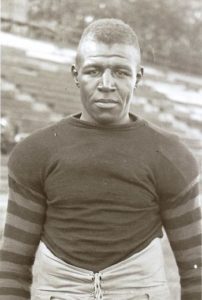
Duke Slater
*"Duke" Slater was born on this date in 1898. He was a Black football player and judge.
Frederick Wayman "Duke" Slater was born in Normal, Illinois, the son of George Slater, a Methodist minister. As a boy, he picked up the name of the family dog, Duke, as a personal nickname and would carry it all his life. When Duke Slater was 13 years old, his family moved to Clinton, Iowa, after his father became pastor of the A.M.E. church there.
In the early 1900s, every high school player needed to provide shoes and a helmet. His father could not afford both, so he asked his son to choose. Slater decided he needed shoes more and played every game at Clinton High School without a helmet. Meanwhile, Slater's feet were so big that his shoes had to be specially ordered from Chicago. Slater played three football seasons for Clinton High School from 1913 to 1915.
He participated in two Iowa state championships, and the school compiled a 22-3-1 record. Slater played college football at the University of Iowa from 1918 to 1921. Playing tackle on the line, he was a first-team All-American in 1921 and a member of the Hawkeyes’ 1921 national championship team. Slater joined the National Football League (NFL) in 1922, becoming the first Black lineman in league history.
He played ten seasons in the NFL for the Rock Island Independents and the Chicago Cardinals, garnering seven all-pro selections. While playing in the NFL, Slater returned to Iowa in the offseason to attend law school. He earned his law degree from the University of Iowa’s College of Law in 1928. He then practiced law in Chicago while playing for the Cardinals. After one year as a high school coach and athletic director in Oklahoma City, Slater returned to Chicago in 1933 as an attorney. Slater earned his law degree in 1928 and began to practice law in Chicago.
Two years after Duke Slater retired, the NFL enacted an unofficial color ban; no Blacks appeared in the NFL from 1934 to 1945. Slater helped give black football players a place to play by assembling and coaching several all-star teams of Black players. Slater served as head coach of the Chicago Negro All-Stars (1933), the Chicago Brown Bombers (1937), the Chicago Comets (1939), and the Chicago Panthers (1940). Slater also served as an assistant coach for the Chicago Negro All-Stars in a 1938 exhibition against the Chicago Bears.
In 1948, he was elected to the Cook County Municipal Court after receiving nearly one million votes. Duke Slater was the second Black judge in Chicago history, following Wendell E. Green, who was elected in 1942. Slater served two six-year terms on the Municipal Court. In 1960, he was the first Black elected to the Cook County Superior Court, the highest court in Chicago at the time. Four years later, Slater moved to the Circuit Court of Cook County. He was an active booster and recruiter for the University of Iowa.
He recruited dozens of prominent Black athletes to Iowa City, including Ozzie Simmons, Jim Walker, Emlen Tunnell, and many others. Slater married Etta Searcy in 1926, and they remained married until she died in 1962; they had no children. Duke Slater died on August 14, 1966, at age 67, of stomach cancer and was buried in Mount Glenwood Cemetery south of Chicago. He was enshrined in the College Football Hall of Fame in 1951 and the Pro Football Hall of Fame's Centennial Class in 2020.